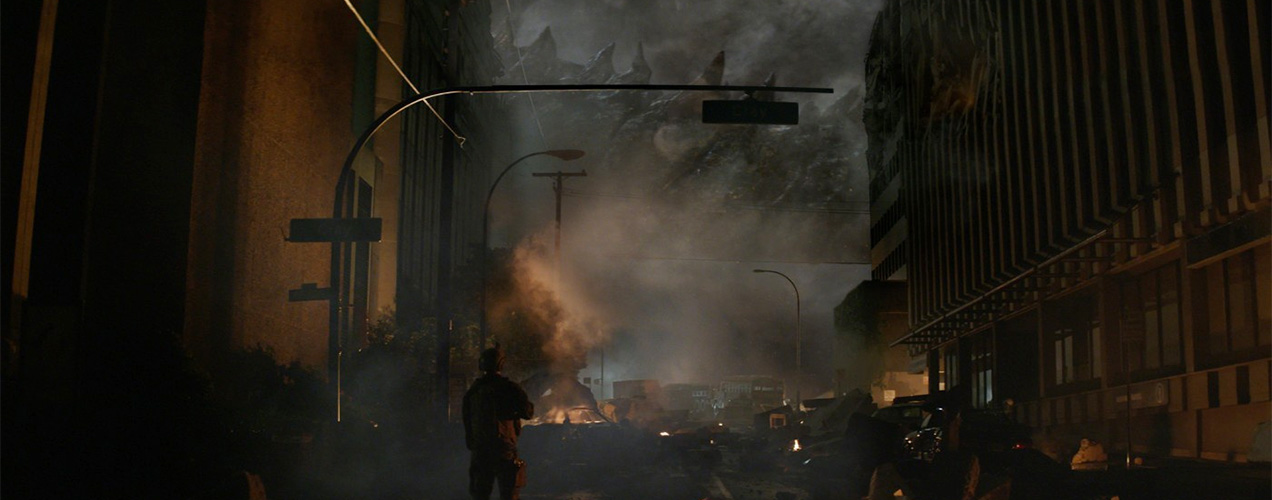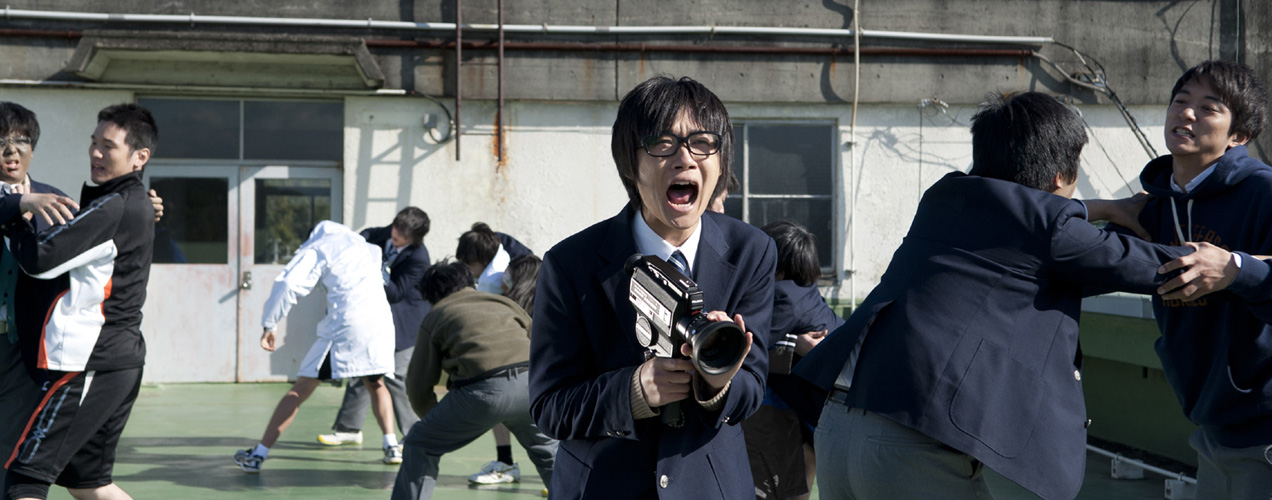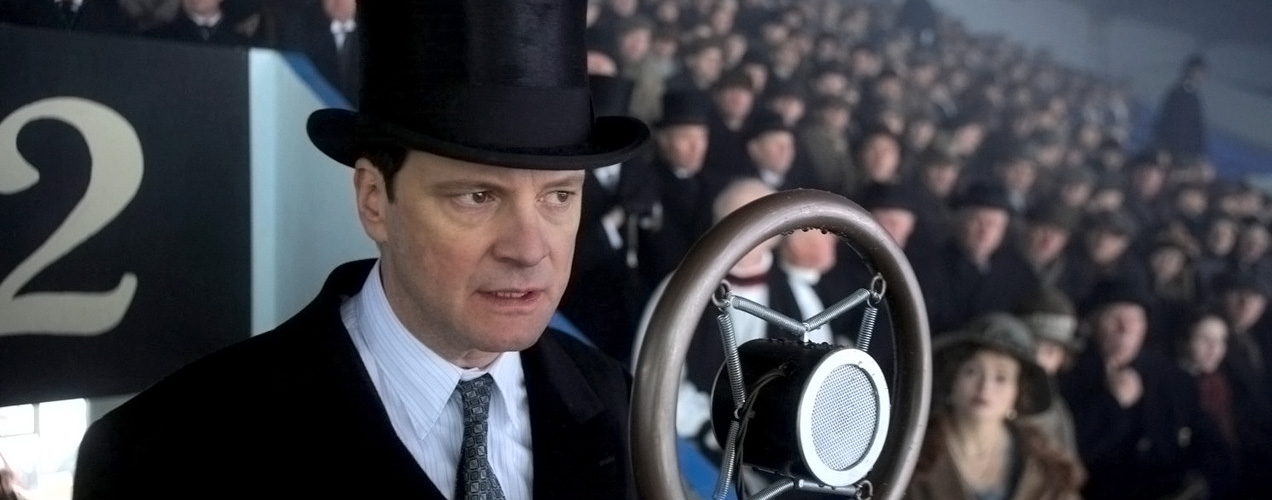2004 / Jang Yun-hyeon > Some is a fairly intelligent mystery/sci-fi/thriller that may as well have been founded on a Philip K. Dick story, and it also shouldn’t surprise anyone that it’s written by the same woman responsible for Il Mare (later remade as The Lake House in Hollywood). The crux of the plot deals with a character having a special kind of foresight, though the film does a solid job of building around the technique so that it doesn’t become a silly gimmick. The direction is so tight that the viewer rarely gets a breather. Gone completely under the radar by many, this is a film that, while not groundbreaking, should be more voraciously consumed by those looking for twists in the action genre.
Category Archives: 3.5

Godzilla
2014 / Gareth Edwards > You’ve done it, Gareth Edwards: You have given me everything I’ve ever wanted in a mainstream monster film in a neat, two-hour package. The subtlety, the lore, the focus on the smallest of details. In fact, you’ve almost made me forget Ferris Bueller’s taint on Godzilla! Your ability to capture the feeling of a devastating, towering presence in a metropolis of your choosing has yielded memories of classic kaiju adventures! The respect you pay to the genre is only surpassed by your much needed attention to what the audience wants, though not at the detriment to basic filmgoing intelligence. There is family drama, romance, monsters, science, some math and even a little sex (though probably not the kind we deem to be normal). It has twists, turns but not the kind that Shyamalan would throw upon an innocent bystander! What I appreciated most were the aesthetics. The bits that made me care, the hints and the heartbreaks without going overboard and at just the right moments.
And by the way, how did you ever get “Kick-Ass” guy to look like an action hero? Kudos!

The Kirishima Thing

 2012 / Yoshida Daihachi > In many ways, Gus Van Sant’s Elephant is the best satirical parable about teenage high school life ever put on film. It worked because it was intensely believable even when it went overboard because the tiny details surrounding the giant “laughs” were real, based on experience. However, the fact that it had to utilize the Columbine Massacre was an unfortunate side effect of what it took to get the point across. (( If you want a more literal (and serious) depiction of a similar topic, you can’t go wrong with Denis Villeneuve’s Polytechnique.))
2012 / Yoshida Daihachi > In many ways, Gus Van Sant’s Elephant is the best satirical parable about teenage high school life ever put on film. It worked because it was intensely believable even when it went overboard because the tiny details surrounding the giant “laughs” were real, based on experience. However, the fact that it had to utilize the Columbine Massacre was an unfortunate side effect of what it took to get the point across. (( If you want a more literal (and serious) depiction of a similar topic, you can’t go wrong with Denis Villeneuve’s Polytechnique.))
In The Kirishima Thing, winner of the Japanese Academy Award for Best Picture, it seems a lot simpler: The captain of the high school’s volleyball team suddenly decides to quit. And all hell ensues.
It may strike the average viewer as an event of irrelevance, but in the microcosm of a small school, consider them losing LeBron James to not even free agency but boredom. Cleveland burned jerseys, but these kids are about to chow down on effigies. Someone symbolic to the culture of a world so miniature leaves and a hole is discovered inside that needs to be filled. But can it be filled? Who will fill it? And how will it affect the balance of that world?
People who follow a person like this, regardless of form and function—are they worthy of one’s attention? Are they, maybe, possibly, the contemporary definition of a zombie? Interestingly enough, that’s what our director is getting at. It may ultimately be a fairly shallow statement, but the so-called losers of this world know one simple thing: This is the world they have to live in. Talented people, such as our MacGuffin Kirishima, believe there is a way out of whatever hellhole they are stuck in. But others need to accept and move on. And often, it just so happens, that comes in the form of fiction—through literature or film or song—a solution outside reality that people insist on.
Those who feel predestined due to their beauty, athletics or traditional intelligence are the ones who are stuck. Those who know no other path are content in finding a way under the radar. It works not only as an analysis of high school social hierarchies but also class subcultures throughout the world. Like the boys and girls of mumblecore who whine about their middle class existence (( Best experienced in Joe Swanberg’s Hannah Takes the Stairs. )) while still succeeding in life beyond the average Joe, it’s always the people who have options to rise up or fall who find themselves in states of jealousy or at odds with their paths. Those who have nowhere to go but up know the direction they must take.

Mystery

 2012 / Lou Ye > Nowhere do we struggle with the nature of good and evil more than when it comes to money. And in an ever-expanding Chinese economy, such dilemmas fly in the face at breakneck speed. So, it’s of little surprise that at the center of Lou Ye’s return to mainland filmmaking (( While it didn’t get a big release locally, Suzhou River is one of the better introductions to modern mainland cinema. )) is the changing subculture of China where corruption and lust intersect to ruin lives, loves and families.
2012 / Lou Ye > Nowhere do we struggle with the nature of good and evil more than when it comes to money. And in an ever-expanding Chinese economy, such dilemmas fly in the face at breakneck speed. So, it’s of little surprise that at the center of Lou Ye’s return to mainland filmmaking (( While it didn’t get a big release locally, Suzhou River is one of the better introductions to modern mainland cinema. )) is the changing subculture of China where corruption and lust intersect to ruin lives, loves and families.
At its core, Mystery is a solid thriller about infidelity, with twists that are genuinely unexpected and satisfying as long as the viewer doesn’t venture into spoiler-filled reviews. What’s impressive—as noted by the film winning best screenplay as well as best picture at the latest Asian Film Awards—is its ability to subtly shift its emphasis from a blatant and obvious (if entertaining) genre film into a social statement.
The beautiful Hao Lei (of Summer Palace fame) stars as a well-off housewife who discovers that all is not proper in her seemingly ideal household, and that her husband may or may not be playing hooky with a girl of bountiful youth. And then the wheels fall off, resulting in an analysis of a curiously amoralistic character who is so not due to nature but rather her circumstances. Surrounding her are pawns of the landscape: A mother with an adorable son whose father seems perpetually absent. A spoiled, rich boy who believes that money buys apartments, fast cars, freedom and innocence. A mother who’s lost her daughter and wants someone to pay for the crime—maybe even literally. And a husband who, sitting next to his wonderful and loving wife, can look deep into her eyes and lie. But why does he lie? Because by all counts, he seems like a good man.
All is not what it seems in this new world of fancy coffee shops and haute shopping malls. But then again, one has to wonder how much of this is China, how much of this is globalization or capitalism, how much of this is the world changing around us. Isn’t this just human nature? Will we always find a way to please that part of us that wants to act on instinct and wantonness, ravaging an otherwise content life?
This is Lou Ye’s first film to premiere in China since he received a five year ban (( Though he did take his skills to France to craft a tragic international love story starring A Prophet’s Tahar Rahim in Love and Bruises.)) for screening the sexually explicit Summer Palace, capturing a dreamlike love affair against the backdrop of Tiananmen Square, at Cannes without the government’s permission. Here, his commentary isn’t focused on the government that has become a shell of itself. Instead, it’s about the country’s progression towards a market economy where an individual’s sense of freedom comes at the expense of a widening wealth gap. It’s a world where the rich sneak past the one-child policy and daughters are buried in cash—sometimes just to keep a little face.

The Place Beyond the Pines
2012 / Derek Cianfrance > A generational crime saga back-ended by a coming-of-age story of discovery and loss, The Place Beyond the Pines is a confluence of genres that don’t often see each other at the cinema. And if you take into effect its headliners—current A-listers Ryan Gosling and Bradley Cooper—you’re in for a bigger shock considering the pace at which the film plays out. Unlike Cianfrance’s last effort, the painful-to-watch but ultimately impressive Blue Valentine (( Our 6th favorite film of 2010. )), Pines flows fairly smoothly, but it’s also not as snazzy as mainstream filmgoers would expect. It’s a slow burn (clocking in at almost 2.5 hours) that’s heavily dependent on meditating upon the past. The nature of forgiveness, a topic the Dardennes (( The Son is a particularly great example. )) have nearly perfected, is at the forefront as we see fathers and sons come to terms with who they are. In fact, the film sets forth a “manly” proposition in defining the roles of sons through their paternal spirit at the expense of loving but ignored mothers. Whether you buy that premise or not, one thing that’ll stay with you is the performance of Dane DeHaan (( Soon to be famous as Harry Osborne in The Amazing-Spider Man 2. )), whose turn as a fatherless teenager will pour sympathy out of your guts.

Prometheus
2012 / Ridley Scott > Michael Fassbender is the best android ever: This, sadly, is the one true takeaway from Ridley Scott’s return to the Alien universe. If forced to admit another, it would be that the elder Scott brother has now further cemented himself as arguably the single most overrated director working today. For him, style over substance has become par for course, and while that isn’t a bad thing, it’s consistently kept him from being great since 1982. His ability to generate such incredible hype based on the success of two films made 30 and 33 years ago is a testament to the power of the Hollywood hierarchy.
Much of this is incredibly frustrating because, while I prepared for Prometheus with lowered expectations, there were still enough moments of complete awe for me to start hoping that, by the end, there would be some kind of pathos that made the experience complete. But there wasn’t, not really. Not the kind of thing that you remember for years on end and harken back to as a point of continuous reference. Who could forget “tears in the rain?” Isn’t that scene what made Blade Runner click? I’d argue that scene alone is responsible for half of the film’s cult following. It perfectly encompassed everything, thematically and spiritually, and completed both the characters’ and the audiences’ emotional arc. In other words, it’s exactly what Prometheus was missing.
Visually, it’s gorgeous, spellbinding. The vast landscapes are easy on the eyes but creeping on the nerves. There’s tension built into every shot, every angle. In fact, it’s so beautiful that I even excused the presence of a few obviously stock characters. Then again, the film is so concerned with looks that Noomi Rapace, giving her best performance since The Girl with the Dragon Tattoo, has full make-up on while on exploration missions deep inside alien caves. Still, maybe she’s just that type, right?
There’s no nitpicking here: The film clearly lacks rationale for quite a few of its climactic sequences. This, of course, shouldn’t be surprising since it’s written by the mastermind behind the con that was Lost: Damon Lindelof. His outline is simple: Create mysteries, throw down an emotional smokescreen and walk away without answers. And I’m not even suggesting that we need anything concrete—the best films leave room for our imagination—we just need context. Context allows us to connect the dots and make films personal. This film, it’s not personal. It’s a hollow shell with beautiful, gorgeous explosions and even prettier eye candy. With more restraint, Prometheus could—and should—have been amazing, but instead we’ll just have to settle for a forgettably good time.

Punch
2011 / Lee Han > Punch is not a blockbuster. It’s about a poor high school kid growing up with a disabled father hellbent on dancing at a cabaret. It’s about mothers and being an outsider in a closed off world. It’s about fathers and sons and teachers and students. Most importantly, it’s about knowing that one cannot separate all these, that in the evermore complicated world we live in, everything converges at once, and we must learn to find solace in such traffic. And yet, maybe that’s why the film sold 5.3 million tickets in South Korea (or a tenth of the population). In every aspect of the film, there’s something to identify with. And while Punch isn’t glossy, Lee’s direction has shadows of Ozu’s Floating Weeds in its relatively gentle approach to otherwise serious matters.
Centered around a subdued effort by Yoo Ah-in, who himself was a drop out and rose through the ranks as an independent actor, Punch successfully converges the aforementioned topics into a calming, enjoyable piece of work that touches upon, most interestingly but within respectable context, the institution of international marriage. Wan-deuk, the film’s Korean namesake, discovers that his mother is Filipino. Combined with a hunchbacked father, the duo is a troubling mix for any teenager. Yet with the guidance of a teacher (who also happens to be his next door neighbour), he pushes through while learning some kickboxing along the way. At its weakest, it’s charming. At its strongest, Punch exposes a sizable majority of the Korean population to the optimistic end of broken homes. All this being said, it does one thing more…
Choi Min-sik (Oldboy), Song Kang-ho (Memories of Murder) and Sol Kyung-gu (Peppermint Candy): For the last decade plus, these three have been the male triumvirate of Korean cinema. Their range, skill and ability to carry films even with minimal screentime have been a gift to moviegoers, but now we must work on adding a fourth: Kim Yun-seok. Active throughout the 2000s, Kim truly broke out as the morally melted cop-slash-pimp in Na Hong-jin’s The Chaser in 2008. He followed that up with a grinding, fearless performance in Na’s follow-up, The Yellow Sea, where he’s a Korean gangster from across the waters. And now comes his turn as an enigmatic teacher whose moral compass seems a bit off. It’s a role that’s vastly different from the hard-edged nature of his previously noted efforts, but it’s one that he owns. Yoo and Kim’s back-and-forth rapport is a joy to watch and keeps the film from becoming an out-and-out melodrama.
To fully capture the impact of Punch in the Korean mindset, it should been noted that Filipino immigrant Jasmine Lee, who plays Wan-deuk’s mother, has been shortlisted by the majority-controlling Saenuri Party as a potential candidate. Whether this is smoke and fog doesn’t matter. The fact that this is even a possibility is significant in Korean culture and politics and speaks to the impact of the film.

Dragon
 2011 / Peter Chan > Finally, something with flavor: After a series of bland, bloated martial arts/war epics from mainland China, Dragon (or Swordsmen, as it was called previously, or Wu Xia, as it was called at its Cannes premiere) arrives with just enough salt to tend the wound. Half-police procedural and half-actioner, Chan makes good in building depth so that we care about what’s behind the fighting. As Takeshi Kaneshiro’s detective unveils the mystery of Donnie Yen, a common villager with a dubious past, it’s hard not to think of this as a Chinese take on Out of the Past and A History of Violence. Then again, it’s not so much that the film does anything new, but rather that it succeeds in being poignant, focused and rarely tries to hide behind the melodrama that has plagued its peers. Brooding and often brutal, it’s a much-needed kick into an otherwise stagnating genre.
2011 / Peter Chan > Finally, something with flavor: After a series of bland, bloated martial arts/war epics from mainland China, Dragon (or Swordsmen, as it was called previously, or Wu Xia, as it was called at its Cannes premiere) arrives with just enough salt to tend the wound. Half-police procedural and half-actioner, Chan makes good in building depth so that we care about what’s behind the fighting. As Takeshi Kaneshiro’s detective unveils the mystery of Donnie Yen, a common villager with a dubious past, it’s hard not to think of this as a Chinese take on Out of the Past and A History of Violence. Then again, it’s not so much that the film does anything new, but rather that it succeeds in being poignant, focused and rarely tries to hide behind the melodrama that has plagued its peers. Brooding and often brutal, it’s a much-needed kick into an otherwise stagnating genre.

Fury
1936 / Fritz Lang > In cinema, lynch mobs are so often associated with the treatment of blacks in the South that we forget how such mentality exists across all of society. From To Kill a Mockingbird to The Ox-Bow Incident, we can note that it’s just human nature to let our personal beliefs slide when coerced into a majority. Whether it’s right or not, that’s what ends up being for debate. Should one persecute only the leaders of a mob or everyone involved, no matter how little their contribution? In Lang’s first film in the United States after fleeing Nazi Germany, he embodies this metaphor for his homeland with Spencer Tracy at the forefront. Fury is straight-forward, book-ended by just enough sentimentality to give context to the proceedings. The moral preaching is kept to a minimum, which allows the film to breathe in the minds of viewers after it concludes. Ultimately, when held up against the backdrop of what happened during the Third Reich, the film goes beyond entertainment and caps a perfect beginning to Lang’s Hollywood career.

The King’s Speech
2010 / Tom Hooper > Founded on a screenplay by David Seidler filled with clever quips, The King’s Speech is an enjoyable if sometimes too conventional re-creation of British history. It does play on the softer side of things (leaving out much of Edward VIII’s pro-Nazi sentiments) while too often accentuating the melodrama. But what really makes the film stand out are its two central actors: Colin Firth (who will probably win the Oscar even if his isn’t the singular best performance of the year) and Geoffrey Rush play off each other so delightfully that all fundamental shortcomings of the film are easy to ignore.

